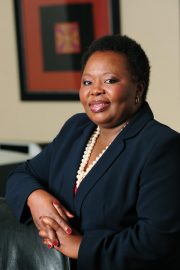
When South Africa assumed the Chair of the African Union, President Cyril Ramaphosa made an undertaking that the continent’s women’s financial and economic inclusion will be high on the agenda.
South Africa’s Chairship of the AU also coincided with a number of important milestones on the continent and globally. Among these milestones is the end of the 2010 to 2020 Decade of African Women which focussed on gender equality and women empowerment. This year is also the final year of the commitment made in the African Agenda 2063 of ensuring 50 percent women representation in decision-making by 2020.
The launch of the African Continental Free Trade Area comes at an opportune time to help accelerate women growth and development. It establishes a single African market that enhances inclusive economic development and trade across our continent. A key thrust of South Africa’s tenure as Chair is to implement the AfCFTA to strengthen regional trade and industrialisation.
The AfCFTA will create opportunities that will benefit many women in particular across the continent as the export of goods and services is boosted. Fostering greater trade between African nations will help deepen economic integration in line with the AU’s Agenda 2063.
This year was earmarked as a pivotal one for women empowerment on the continent, and although the COVID19 pandemic has caused massive disruption there has been notable progress. South Africa has made gender equality and women’s empowerment central to the transformation agenda and it is also at the heart of efforts to ensure sustainable development.
By establishing the Department of Women, Youth and Persons with Disabilities, South Africa have created institutional capacity dedicated to development and prosperity. The Gender Equality Bill was introduced to accelerate the empowerment of women and attain 50/50 gender parity for the country. The Commission on Gender Equality is mandated to monitor, evaluate and research women’s rights and gender equality in the country.
As a continent, we have found that investing in women is one of the most effective development tools to uplift society.
Evidence has shown in both developed and developing economies that when more women join the labour force, an in particular become entrepreneurs, there is a rise in gross domestic product. This empowerment also spreads to families and communities with improved levels of education, increased levels of health, reduction in poverty and starvation, and stronger communities.
By devoting an entire decade to women, African leaders have demonstrated their political will and commitment to promoting gender equality, women’s empowerment and women’s rights. Throughout the decade, considerable progress was made in translating commitment into measurable action as most African countries took giant steps to elevate the status of women through legal and constitutional means, institutional gender mechanisms, as well as creating conducive environments for women to realise their potential.
Other notable achievements are that African states have improved women’s access to education, modern technologies, infrastructure and services.
The same can be said for more representation of women in sectors traditionally dominated by men, such as mining, finance, commercial agriculture and commercial fishing, among others.
Although these are all welcome developments, the continent still has a long way to go in breaking down barriers and the proverbial glass ceiling. The continent must address issues of socio-economic and cultural constraints, along with harmful cultural practices. African states must address gender-based violence, and ensure a level playing field with regard to property ownership, land and inheritance.
The new African Women’s Decade on Financial and Economic Inclusion of African Women 2020-2030, is an opportunity for AU member states have to take appropriate action to fully implement commitments to advance the welfare of women in the continent.
South Africa is currently releasing over 700 000 hectares of state-owned land and has committed to ensure that 50% of this land goes to women.
The new decade will also see efforts to ensure greater availability of financial resources and equality of opportunities to access financial services.
Financial inclusion is critical to the empowerment of women and the improvement of their quality of life particularly if coupled with financial literacy.
Africa must explore the idea of gendered financing tools to target, in particular, young women entrepreneurs who wish to start businesses. The continent must incubate and provide access to markets to allow these entrepreneurs to get off the ground.
The past decade has shown that much can be achieved with dedication and focus. Let us ensure that we blaze a new trail over the coming months and years by unlocking the unlimited potential of women on our continent.
Addressing attitudes towards women, will ensure that our attitude towards growth and prosperity is realised.
Ms Phumla Williams is Director-General of Government Communication and Information System and Cabinet spokesperson in South Africa.


